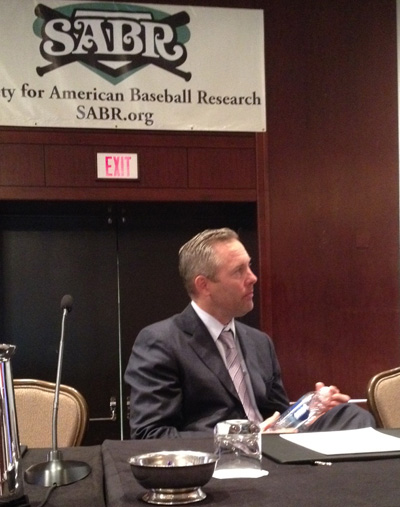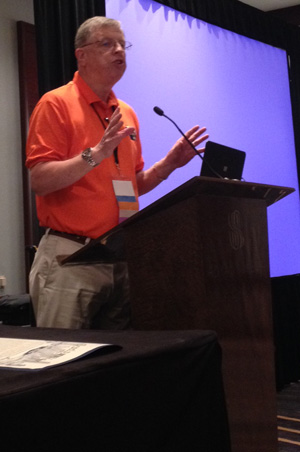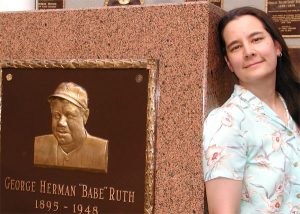Here are my notes on the SABR 44 keynote by Reid Ryan in Houston. If you’re not familiar with Mr. Ryan you might have thought you were about to hear a speech by a dull front-office wonk. Savvy folks however might have realized that Ryan is a pretty big name in Texas baseball.
Houston Chapter President Bob Dorrill introduced the speaker with a recounting of Reid Ryan’s career and accomplishments, which are significant. Among other things he pitched for the Texas Rangers after graduating from TCU, was the founder of the Round Rock Express minor league team, and of course more recently has taken the job as president of the Houston Astros. He left it to Ryan himself to reveal to anyone not in the know that he also happens to be Nolan Ryan’s son.
What followed was an anecdote-packed recounting of some of Ryan’s favorite memories of the journey through baseball that led him first as a kid following his Dad from major league city to major league city all the way to what he’s trying to accomplish with Houston today.
What you see here is not a complete transcript, but is what I could capture taking notes live during Ryan’s talk. It may contain some paraphrasing, but for the most part I try to get as much verbatim as possible.
Reid Ryan:Thank you guys very much. It’s so exciting to be here today! Welcome to Houston, Texas, welcome to SABR 44.
I have point out a couple of people here today. This is a game of relationships and Roland Hemond, I’ve been watching you over the years at the winter meetings. It doesn’t matter if it’s the President of the United States or an 18-year-old kid trying to get a internship, you treat everyone great. And Tal Smith! Tal Smith IS the Houston Astros. Tal, I have to say, I always look at the way the game is today and I think you know if we had the playoff system in the past that we have today, I think the Astros would have three or four World Series by now.
Now. Put on your seat belts and I will let you know how things go in the Ryan family and growing up in baseball being Nolan Ryan’s son. But first let me say that you folks in SABR, the 6000 members of SABR, you are the heart and soul of baseball and it is an honor to be here here today.
My life has always been about baseball. I tell folks I was born in the clubhouse. I was actually born three months before my dad was traded from the Mets. He was able to be part of a World Series championship there. But not a lot of people know about his military commitment. He had made a commitment to the Army Reserves because the Mets had told him by going in the reserves he could avoid the draft. So he was going to Fort Hood and Fort Leonard. I asked him: When was the first time you had a pitching coach? Dad says he didn’t have a pitching coach until he got to the major leagues. So he would be going to the Reserves, then back and forth to the team, and it was all trial and error, trial and error. No wonder he struggled there.
My first baseball memories are of the Angels. I remember going to the stadium at after the games popping wax paper cups. We would line them up and stomp on them. One of my favorite people was Jimmy Reese. He had been a bat boy for the Yankees and had become a prodigious fungo hitter. He would saw a bat in half and he could hit anywhere. Also you have to talk about Gene Autry who was one of my dad’s favorite owners. Gene had a sidekick in real life, Gene Budry, the same guy who was in the movies with him. They were real life friends and he was like “come on down to the movies with me.” My dad would always say whenever Gene showed up that was when the drinking started.
One time Gene [I don’t know if he means Autry or Budry here… -ctan] spoke at a banquet. He had been drinking, and he said he was so pleased to be speaking to this group. He said you know, it’s wonderful to see all these ladies here all dressed up. Ladies, you’re like a rose garden. And all the ladies are looking around at each other very nice. And then he said “Just like a rose garden, has the flowers and then it also has the weeds.” And then he walked off and left them all looking at each other trying to figure out who he meant.1979 was an interesting year for me. I was run over by a car. I was playing in the front yard and got run over by a car. I lost my spleen and broke my leg, and a lot of my dad’s teammates came to see me in the hospital. One was Don Baylor. He came and told me he was going to hit a home run for me that night. And he actually did. Not everyone can say that a major leaguer hit a home run for them.
One of my memories is of the bus ride after the loss [in the 1979 playoffs]. The quiet and the stillness of a team that had worked so hard and so long [only to be out of it.] Seeing the Willie Stargell Pirates win the World Series really drove home to me how special and difficult it is to win the World Series, even with a talented team.
So the way it used to work is we would go and play wherever but then we’d come home to Texas where we lived. But after my dad signed his million dollar contract our town in Texas had a big pep rally for my dad. That started people looking at us a little different. Before that we were just the Ryans around town. But the Astros created so much excitement. You can’t buy that kind of excitement, you have to earn it. Those guys became my team: and that’s what we want to do these days, we want to make that connection to the fans and we want to win.
1986 was just a tremendous year. They had Orosco and some guys from the Mets on TV the other day, it was special. For me the highlight was those three games, [name missing] started by striking out eight guys in a row, and my dad threw a one hitter, and then Mike Scott threw a perfect game. For a clinching situation, that was truly amazing.
[Then the trade to the Rangers] Going from here and the Astrodome to the old Arlington Stadium it was like going to the minor leagues. They had a core group of young players there, Ruben Sierra, Pete Incaviligia, Kevin Brown, Robb Nenn, Kenny Rogers, and of course manager Bobby Valentine. It was a fast and loose environment, I’d never seen anything like it before! There was a kind of rivalry between Julio Franco and Ruben Sierra. If Franco went out and bought a sports car that was all tricked out, the next day Ruben Sierra would show up with a car even more tricked out. Well, one day Franco came down to team stretch with two baby tigers. He had gone out and bought two tigers. So the next day Sierra came in with a wolf. Not kidding.
The one thing everyone remembers about my Dad’s time with the Rangers is the fight with Robin Ventura. From that one thing he became the hero to every forty-year-old guy in America, I think. An interesting story: I was in a collegiate league the J-Hawk league, at the time where I was friends and teammtes with Jeremy Giambi. Yeah, the same Jeremy Giambi who didn’t slide. We had a day off that day and we drove to the game thinking we’d get there in time to see the game. But we had traffic, and so we got there and walked in literally two pitches before the fight.
As you can tell, baseball has had a tremendous impact on my life. From high school baseball to my time in the minor leagues, to getting Fox to put the high school state championship on TV, I played at U of Texas and TCU, we started one of the first college tournaments here, and then of course the major leagues. It was really fun for me to go out in my career. I watched my dad’s seventh no-hitter with a guy who was a two-time Golden Spikes winner. We were on a pretty good team together. Any time you can be on a championship team you have to enjoy it because it’s so rare and special.
[During college] We had a promo called “Ryan versus Ryan,” and the Rangers came and played the Longhorns in an exhibition game. Coach Gus was a legend and very well known in college baseball. Coach Gus had his pitchers and eight other guys who were “his guys” and he would have 50 other guys on the team but he would only play his own guys, really. He would get up and make a speech how anyone could walk onto that team, and we had one guy name Maury who was a walk-on, who hit .500 in the fall, but he never could crack the lineup because it didn’t matter if the team was leading 20 to 1, Coach Gus just played his guys. But that day he let everyone play, including Maury. Maury goes up to the plate to face my dad and… strike one, strike two, strike three, he looked at three pitches against my dad and we said to him why didn’t you at least swing?
The fact I still remember that shows how this game affects you [and gets under your skin and becomes a part of you.]
I then transferred to TCU and spent 3 years there, and then was drafted by the Rangers in the 17th round. Then began my minor league chapter of my life. I had never been to a minor league stadium or game. Hudson Valley was owned by Marv Goldklang. They had struggled to build that stadium. There had been a lot of snow that winter. They were laying down the grass right before the first game, and the bullpens weren’t finished yet, so they quickly built two mounds and both teams had to sit out there in the same bullpen. I don’t recommend that.
The fun we have at the minor league level is unparalleled. As you go up, the money ratchets up, the pressure ratchets up, so the fun is really the biggest thing at those low levels. My friend Dom knew this. He was in his late twenties and didn’t break camp with the major league club. He was a right handed hitter. One day he gets hit in the head in a game and everyone ran out to see if he was okay, the trainer brought out the smelling salts–he wasn’t moving. Finally he gets up, gives the okay sign, everyone’s clapping… and then he ran to third base. (laughter) He just wanted to do it for the laugh!
There comes that day when you go to your locker and your jersey isn’t there. And you know that means your career is over. When that time came for me, fortunately I had a degree and some skills, I was already married and my wife was still a student at TCU. One day I said, hey, what I should do is start a minor league team in Austin. At the time it was the late nineties and the minor leagues weren’t expanding. There was very little minor league action in Texas. I told my wife that was what I wanted to do and she said that’s great honey and went back to sleep. I figured that meant I had her endorsement and I started knocking on doors.
Eventually we built the Dell Diamond in Round Rock and started the building boom of minor league stadiums all around Texas, as well as Tulsa and other places. Fort Worth, Sugar Land, etc. [long list I couldn’t catch them all] A lot of places where I went and helped them build their stadiums. I don’t know that baseball has ever been in a better spot than it is right now in Texas. We are very blessed to be here today and I feel like I had a small part in that. (spontaneous applause)
There’s an optimistic and naive nature at the early minor leagues where guys think they are on a straight shot to the Hall of Fame. It is so much fun when these guys get called up to the major leagues. One of those guys was Morgan Ensberg. The Round Rock Express one year (AA) won the championship in 2000, I think and 11 of those guys went to the major leagues. [Houston] called and told Jackie Moore “we want to call up Morgan and Keith Ginner” and they had this idea if we won the championship they were going to announce it on the field. We won the game and all the guys are on the field celebrating, and Moore gave the sign and they announced it that they wanted Morgan and Keith to go to home plate for a special announcement. They thought they were getting a player of the game award or something like that, and then the announcer says they were being called up to the major leagues. They both started bawling right there on the field. You have a lifetime of emotion coming out in that moment, from the very first time you played catch with your dad right up to that moment. You live your dreams.
The other big story was a guy who had been through the trials of life. Chris ______[I did not catch his name: corrections welcome!]. It was a AAA environment, there are a lot more bitter veterans around. He had been in and out of baseball, had quit for a while to try to keep his marriage together, it didn’t work out, he had been through every obstacle you can imagine. When the call came, Jackie said get all the guys together, I’m going to tell him. So Jackie called him into his office to give him the news and when he came out the whole team was there to applaud for him. Because he represented all the battles that they all had been through in the game and in life.
[Now about the Astros and their current situation] Making the sausage in front of everybody’s eyes is an ugly process. But we had to tear down the whole structure and rebuild from the beginning. Altuve is one of the most exciting players, seeing the emergence of guys like Jerry Cozart, you look at how many championships we’ve won in the minor leagues, we have really restocked. The talent is coming up. The questions now are: Can we get our TV correct, can we get our stadium pricing correct, and get our economic situation to work out? This market has always attracted free agents. We have wonderful stadium, the tax situation is great, but if we’re not making those steps forward toward winning we won’t attract those free agents.
I’ve learns some interesting lessons. The lessons you learn from sports will carry over into all parts of life. I wrote down a couple of things to share… but before I do that I should say to be successful you have to have a passion for this game. It comes back to bringing joy to people’s lives. We have to understand the DNA of our game. Too many people come into this game who don’t understand that, and they don’t last long. This isn’t just show biz. You look at how the Cardinals, Braves, and Red Sox have done it for years. People who put baseball first.
Jimmy Reese used to say: “treat people how you want to be treated.”
Jackie Moore this Saturday is being inducted as the first member of the Round Rock Hall of Fame. He used to say: “Right is right, wrong is wrong.”
My dad also said “Don’t let the failure of your last pitch ruing the success of your next one.” That’s what we’re trying to do with the Houston Astros.
[I believe the audio and possible the video of the speech will be on the SABR website at some point in the future. -ctan]




Post a Comment